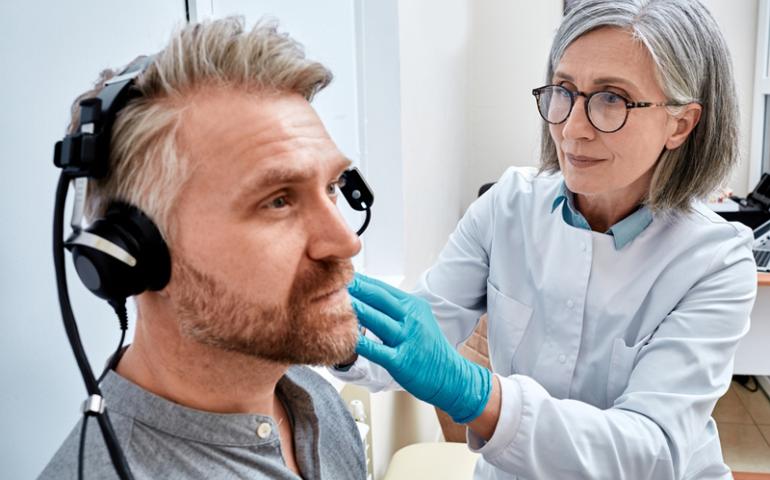Untreated Hearing Loss and Dementia–How Are They Related?
According to the National Council on Aging, 1.5 billion people globally have some form and level of hearing loss. Although hearing difficulties increase as a person ages from natural processes, experts list hearing loss as one of the most preventable chronic conditions in modern times in terms of acceleration and the long-term level of loss. Widespread public awareness and education and more people seeking early detection and intervention would have protected one-half of the people currently suffering from it.
For teens, aging adults, health enthusiasts, and their families, hearing impairment can exact a devastating emotional toll and decrease quality of life. It can cause anxiety, demotivation, and depression that eventually develop into unhealthy behaviors. It can even contribute to cognitive decline and early-onset dementia.
Understanding Untreated Hearing Loss
Teens and adults in their twenties through forties often fail to do enough to protect their ears from damage because they incorrectly believe hearing loss happens entirely from aging. Yet, common additional causes include:
- Medical conditions (i.e., changed blood flow, infections, inner ear problems, genetic syndromes, head traumas, and tumors) and medications at any age that interfere with or damage the inner ear and hearing and balance nerves that process signals.
- Noise levels above 120 decibels (dB) that are acute or above 70 dB with extended exposure, such as noise from fireworks, music listening or television viewing with the sound too high, theater and stadium events with large crowds, and even lawnmowers.
Few people protect themselves enough. In the United States, more than 60 million people above the age of 12 have some type of hearing impairment, with only approximately one-third aged 65 and older. According to 2021 statistics from the National Institute on Deafness and Other Communication Disorders, only 16% of those ages 20 to 69 and 30% of those 70 and older use hearing aids. Researchers estimate that approximately 28 million Americans with some impairment remain untreated, even though they could improve with a traditional or alternative hearing aid.
The Link Between Hearing Loss and Dementia
When you have hearing loss, your body can't receive or process sounds correctly. Whether you call this condition partial or total deafness, hearing impairment, or hearing loss, the outcome is the same. You have more difficulty understanding what's happening in the world around you. Communication becomes impaired as well.
The condition doesn't only involve the physical inability to hear specific sounds or tones. Symptoms can include thumping, ringing, and other feelings and noises generated by nerves and organs of the inner ear or the processing part of the brain that interfere with hearing (i.e., tinnitus) or a reduced tolerance to noise that alters your perception and blocks important sounds (i.e., hyperacusis). With the latter, you might hear quiet sounds as loud or sounds all around you or at a distance better than those in front of or closest to you. With vestibular hyperacusis, you might experience dizziness, extreme fatigue, mental confusion, nausea, and pain from specific sounds or levels of sound.
With any hearing disorder, your mind must work extra hard. Associated fatigue causes focusing problems. Frustration from hearing difficulties, repeatedly asking people to repeat themselves, and other side effects make you more likely to become introverted and less social. These events typically cause cognitive decline over time and increase the risk of an impaired ability to make rational decisions and remember things (i.e., dementia). According to experts who study dementia and related diseases, hearing loss and social isolation reduce cognitive stimulation, increase the chance of depression, and rewire the brain away from lucid, sane mental functions.
Early Intervention and Management
Early detection, treatment, and management are critical to protecting your short-term and long-term health and well-being. Hearing aids, sound-filtering earplugs, decibel testing phone apps, voice-to-text phones and apps, and other technologies specifically designed for hearing protection and management and sound interpretation can help you or someone you love experience a more positive quality of life.
An audiologist can diagnose the specific hearing impairment and offer solutions like Beltone hearing aids. Current options from the Amaze, Imagine, and Serene lines address specific needs. For example, the Beltone Amaze products clarify words by reducing unwanted background noise.
Lifestyle Recommendations for Reducing Dementia Risk
Hearing loss as you age is inevitable. The extent of that loss and the type of impact it has on your life are, for the most part, up to you. Although you can't protect against every potential event that might cause inner ear or other forms of physical damage, you can reduce the risk of dementia through simple changes:
- Agree to vaccinations for diseases known to cause impairment or total deafness.
- Remind children and adults never to use the highest volume setting for music players, phones, and televisions.
- Ask doctors about medication alternatives and treatments for allergies, congestion, eustachian tube dysfunction, and sinusitis.
- Protect your ears in any environment where you expect damaging levels of loud noise or extended periods of loud noise with decibel-adjusting or noise-reduction earplugs. If you or a loved one already experience hearing loss, you need earplugs because you can't detect loud, ear-damaging noise as easily.
- Choose healthy habits (e.g., stop smoking, reduce alcohol and salt consumption to protect blood vessels and balance blood pressure, exercise more often to improve blood flow, keep the mind and memory sharp with brain teasers and mental puzzles, and maintain as many social connections as possible daily).
Contact Us Today!
Hearing loss increases the risk of dementia later in life. Thankfully, behavioral and lifestyle changes, professional diagnostics, and treatments reduce that risk. Our caring team at Beltone Hearing Center HearWell Audiology and Associates has the extensive experience and knowledge to help you achieve a positive outcome on your hearing health journey. We invite you to visit our office or call today for more information.
Sources:
https://www.ncoa.org/adviser/hearing-aids/hearing-loss-statistics/
https://hearinghealthfoundation.org/blogs/17-misconceptions-people-with-hearing-loss
https://dphhs.mt.gov/schoolhealth/chronichealth/developmentaldisabilities/HearingImpairment
https://www.cnn.com/2024/07/02/health/video/prevent-hearing-damage-concert-fireworks-cprog-digvid
https://vestibular.org/article/diagnosis-treatment/vision-hearing/vestibular-hyperacusis/
https://www.cdc.gov/aging/dementia/index.html
https://publichealth.jhu.edu/2023/new-study-links-hearing-loss-with-dementia-in-older-adults
https://www.alzheimers.org.uk/about-dementia/managing-the-risk-of-dementia/reduce-your-risk-of-dementia/hearing-loss
https://www.cdc.gov/aging/publications/features/lower-your-dementia-risk/index.html






